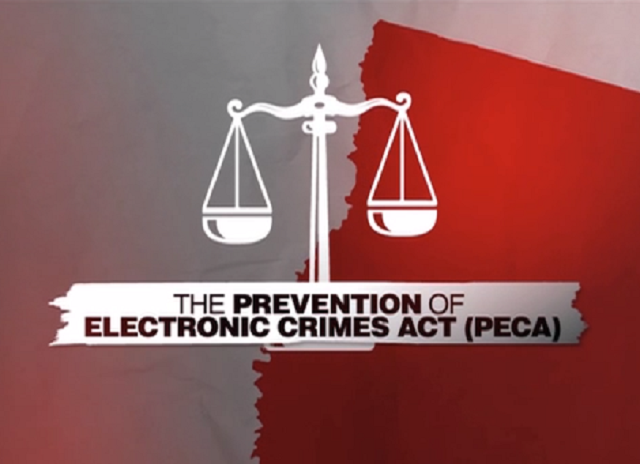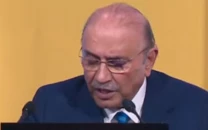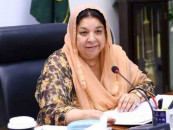Govt establishes special courts to tackle 'digital terrorism'
Law Ministry notifies designates ADSJ and civil judges East & West for trials under PECA

The federal government has designated special courts in Islamabad under the Prevention of Electronic Crimes Act (Peca), 2016, to try “digital terrorists” and those allegedly involved in spreading “anti-state propaganda” through digital content in the virtual world, it emerged on Tuesday.
The federal government’s decision to try people under Peca surfaced after the law ministry issued a notification pertaining to the establishment of the special courts, stating that the decision was taken after consulting the chief justice of the Islamabad High Court (IHC).
“In pursuance of Section 44 (1) of the Prevention of Electronic Crimes Act, 2016 (XL of 2016), the Federal Government in consultation with the Chief Justice of the Islamabad High Court, Islamabad, is pleased to designate the courts of Additional District & Sessions Judges and Civil Judges-cum-Magistrates of Civil Districts & Sessions Divisions (East) & (West), Islamabad for the trial of offences under the said Act in their respective jurisdiction,” the notification read.
Though the notification was issued on July 19, sources in the ruling coalition revealed that the recently-arrested PTI officials, including Information Secretary Raoof Hasan and International Media Coordinator Ahmed Waqas Janjua and others, could also be tried in the newly-designated courts.
“The government has designated special courts in Islamabad under Peca to try digital terrorists and those involved in spreading anti-state propaganda through digital content,” a ruling coalition source told The Express Tribune on condition of anonymity.
Surprisingly, the government’s decision coincides with the statement from military spokesperson Lt-Gen Ahmed Sharif Chaudhry that extremists involved in attacks on law-enforcement personnel and the ‘digital terrorists’ shared the common goal of targeting the military and its leadership.
At a press conference on Monday, the director general of the Inter-Services Public Relations (ISPR) said that the “digital terrorists” were using tools such as cell phones, computers, falsehood, and propaganda to impose their will on society just like regular terrorists did.
In May, Chief of Army Staff Gen Syed Asim Munir had warned that “inimical forces” and their abettors had unleashed “digital terrorism” and were trying hard to create division between the armed forces and the people of Pakistan through peddling “lies, fake news and propaganda”.
On Monday, the interior ministry announced the arrest of Raoof Hasan, while accusing the PTI of engaging in “anti-state propaganda”. The ministry said that a joint investigation team (JIT) was being set up to scrutinise the party’s digital content.
Though the PTI has been on the receiving end since the May 9 attacks on civil and military installations last year, the latest round of state action started on July 23 morning, when the Islamabad police arrested Hasan and confiscated different kinds of material from the party’s secretariat.
Political temperature rose in the country after the Supreme Court declared on July 12 that the PTI was a political party and entitled to the reserved seats. The judgment not only elevated the PTI to the largest party in the National Assembly but also undermined the ruling coalition’s two-thirds majority.
Resultantly, the government challenged the decision and announced that the PTI would be banned, high treason proceedings to be initiated against former prime minister Imran Khan and others; and strict action would be taken against all those involved in targeting Pakistan from here and abroad.
Though it has not been put on the agenda of the cabinet meeting, sources in the ruling Pakistan Muslim League-Nawaz (PML-N) said that the federal cabinet was likely to finalise its decision about banning the PTI and trying Imran, former president Dr Arif Alvi, and former National Assembly deputy speaker Qasim Suri for “unconstitutionally” dissolving the assembly back in April 2022.
In the recent past, the top civil and military leadership had frequently been using the phrase “digital terrorism”, promising not only to defeat it but to also hold all those behind it accountable. The ruling coalition mainly blames the PTI for digital terrorism.
Information Minister Ataullah Tarar recently blamed the then-PTI government for bringing back the Taliban in Pakistan. On the one hand, Tarar had said, shelter was given to the “terrorists” and, on the other hand, they allegedly attacked the GHQ and other state institutions.
The government spokesperson stated that the PTI had practically ended the National Action Plan – a plan to eliminate terrorism and extremism from the country.
Peca was enacted after the then PML-N government felt that the centuries-old legal framework was inadequate and ill-equipped to address the sophisticated online threats of the 21st century, saying the new age had given birth to completely new types of cybercrime and criminals.
According to the statement of objects and reasons, the legislation provides new investigative powers hitherto unavailable, such as search and seizure of digital forensic evidence using technological means, among other powers to effectively investigate cybercrime cases.
Reportedly, the law ministry said that the special courts under Peca had been designated in line with a direction by IHC Justice Babar Sattar, as he had asked the government why no courts were established under Peca. Several attempts were made to take the law minister’s comments but he was not available.



















COMMENTS
Comments are moderated and generally will be posted if they are on-topic and not abusive.
For more information, please see our Comments FAQ